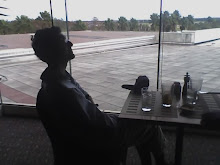This might give many Americans reason to cheer. In the past three decades, Iran has repeatedly angered the United States, and the CIA helpfully summarizes the US' complaints:
Iran has been designated a state sponsor of terrorism for its activities in Lebanon and elsewhere in the world and remains subject to US, UN, and EU economic sanctions and export controls because of its continued involvement in terrorism and its nuclear weapons ambitions.Dare Americans dream that the protestors represent a better alternative than the mullahs who currently rule? This blogger would say no. The combination of young people and street protests offers a tantalizing hope for democracy, but history and current events suggest otherwise.
- Student protests in Iran have a history of going against American interests. On Nov. 4, 1979, student demonstrators took over 60 Americans hostage at the U.S. embassy in Tehran. As PBS reported, "The students vowed not to release the Americans until the U.S. returned the Shah for trial, along with billions of dollars they claimed he had stolen from the Iranian people." The hostage crisis helped sink the government of President Jimmy Carter, and only in 1981, minutes after the inauguration of Carter's successor, Ronald Reagan, did the hostages see freedom.
- The demostrators' darling isn't necessarily democratic. Mir-Hossein Moussavi, the loser of this year's election, didn't materialize out of nowhere. He served as prime minister from 1981 to 1989. And in a pre-election interview with the Financial Times, he had some relatively warm words for his opponent. "Mr Ahmadi-Nejad is the president and for this reason I respect him," Moussavi said. "There are criticisms about his opinions and behaviour. This is natural in countries like ours in which there is freedom. I don’t see Mr Ahmadi-Nejad himself as a danger."




No comments:
Post a Comment